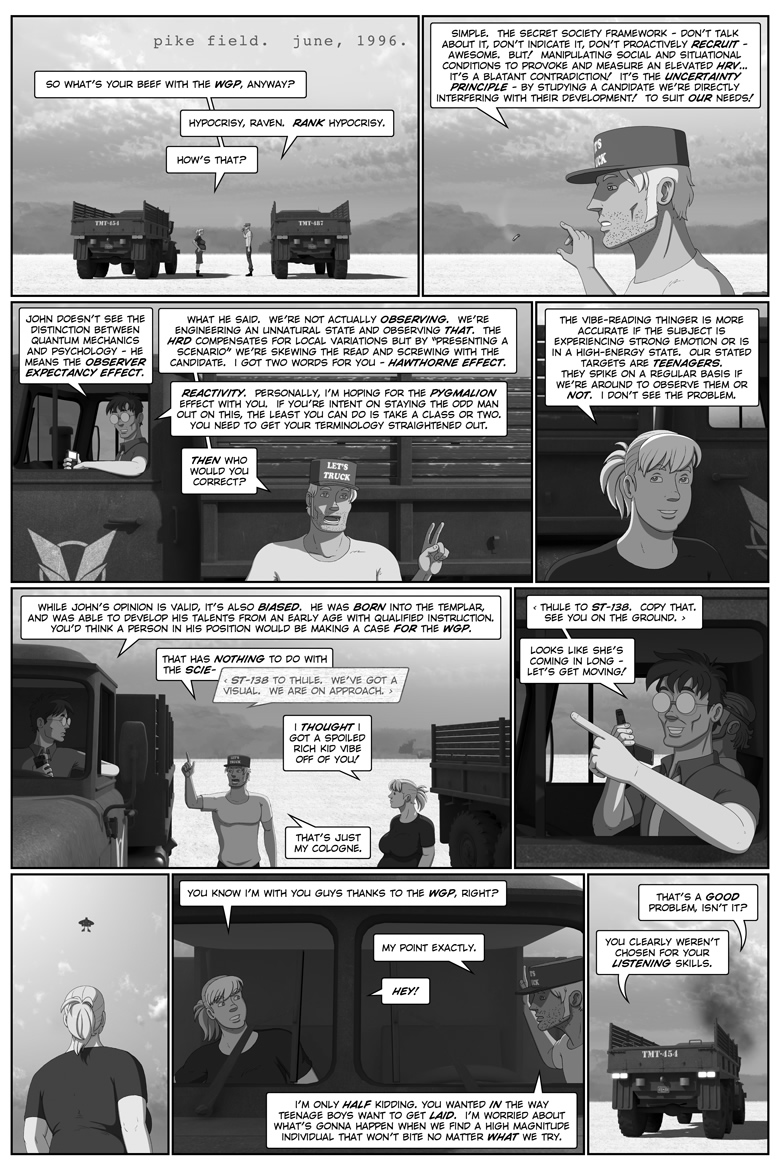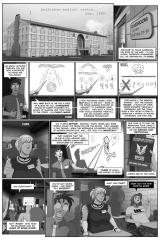A South Jersey punk, a genetically engineered man conceived on another planet and a former Soviet officer who’s now the head of the local chapter of a galaxy-wide secret society drive a couple of Urals into a lake bed in a parallel universe, and the South Jersey punk says…
Long form of “A priest, a rabbi and a nun walk into a bar…”
John’s issues with the WGP, Greymalkin’s issues with John, and some hints of Raven’s disposition. Tantek, while present in panel six, is sitting this one out. The Templar are one big happy dysfunctional family!
Worth noting: Raven is the only member of Thule Garrison who’s formally studied psychology. While Greymalkin is right about John not making much of a distinction between quantum mechanics and mental mechanics, neither Malky nor John have an academic familiarity with Western psychology.
As a Navigator, John’s conflation of the concepts is understandable – he’s capable of moving a starship into Am with his brainmeats, a process that basically boils down to the human will slapping the Standard Model silly. Stirring physics and psychology together is either a personal quirk or a possible “side effect” of whatever navigator training he’s had.
Armchair Psychology
Uncertainty principle – The more precisely the position is measured the less precisely the momentum can be measured (and vice versa).
Observer effect (physics) – Refers to changes that the act of observation will make on the phenomenon being observed. Not mentioned on the page but it is the elephant in the room. We’ll get to it soon enough.
Observer-expectency effect – The observer unconsciously influences the participants in the experiment. See also cognitive bias. John’s primary concern, as he fears Lang’s desire for results is leading to the manufacturing of those results.
Hawthorne effect – Behavior changes in a participant over the course of a study are a result of the study. While WGP candidates are technically observed without measurable interference, anyone who’s ever felt like they’re being watched knows how that sudden jolt of paranoia can influence behavior, and this is likely where John’s head is at vis-a-vis the Hawthorne effect. He’s technically wrong.
Reactivity – Individuals behave differently due to the awareness that they’re being observed. The Hawthorne effect implies (to me, anyway) that the participant willingly enters into the study knowing that it is a study, whereas reactivity as a blanket term is less specific with regards to the disposition of the subject. Thus, Malky’s correction is technically correct.
Pygmalion effect – The greater the expectation, the better the performance. Greymalkin’s sense of humor.
If any of the language on this page is incorrect, misused or abused, I’d chalk it up to character education and worldview. Raven is a shrink (she’s taken a few classes, at least), and she’s pointedly kept quiet – maybe out of respect, possibly out of disinterest.
Mastering notes, 2016.12.05 – Minor adjustments to dialogue in panel eight.








